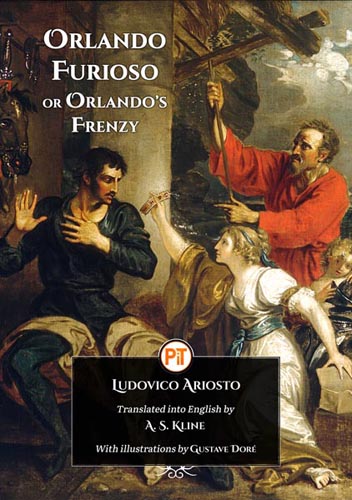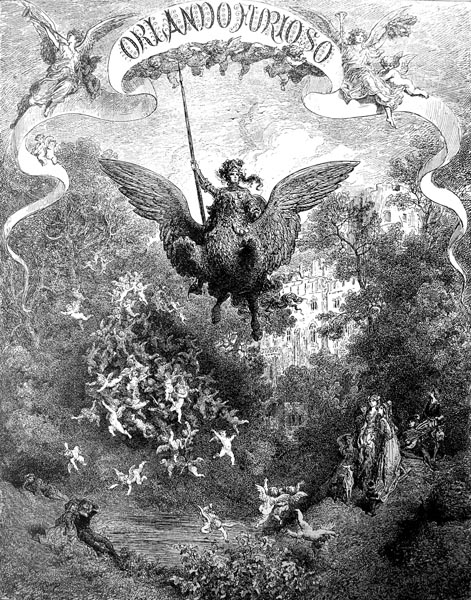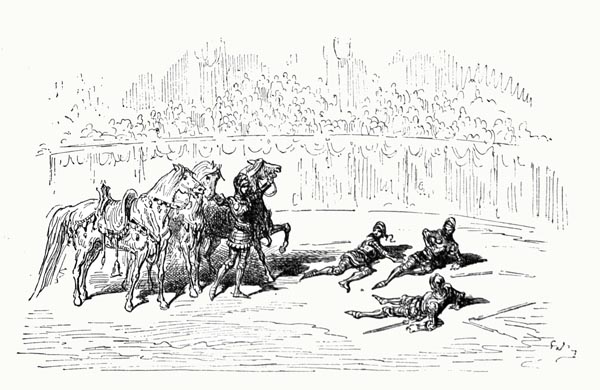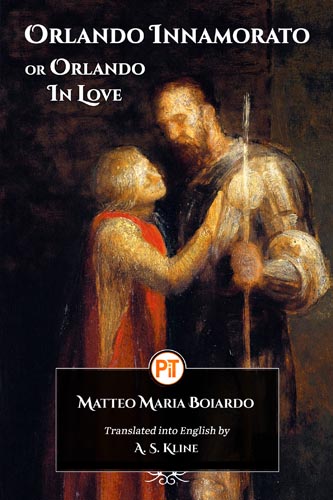Ariosto: Orlando Furioso
A complete English translation
With the full cycle of illustrations by Gustave Doré (France, 1832-1883).

Without food or drink he lay, while the birth,
Thrice, of the rising sun new light conferred...
And upon that dreadful frenzy, he began
The strangest ever seen in mortal man.

Contents
Canto I (In Pursuit of Angelica)
Canto II (The Sorcerer’s Castle)
Canto III (The House of Este)
Canto IV (Bradamante and Ruggiero)
Canto V (The Tale of Ginevra)
Canto VI (The Enchanted Isle)
Canto VII (Alcina the Sorceress)
Canto VIII (Angelica's Plight)
Canto IX (The Tale of Olimpia)
Canto X (Rescued and Rescuer)
Canto XI (Orlando and the Sea-Monster)
Canto XII (The Enchanted Mansion)
Canto XIII (The Tale of Isabella)
Canto XIV (Mandricardo, Doralice, and Rodomonte)
Canto XV (Astolfo's Travels)
Canto XVI (Rinaldo at the Siege of Paris)
Canto XVII (Norandino and the Ogre)
Canto XVIII (Martano's Downfall)
Canto XIX (Angelica and Medoro)
Canto XX (The City of Women)
Canto XXI (Hermonides' Tale)
Canto XXII (Pinabel's Downfall)
Canto XXIII (Orlando's Frenzy)
Canto XXIV (Zerbino's Fate)
Canto XXV (Ricciardetto's Tale)
Canto XXVI (In Pursuit of Vengeance)
Canto XXVII (Conflict and Discord)
Canto XXVIII (The Innkeeper's Tale)
Canto XXIX (Orlando's Wanderings)
Canto XXX (Mandricardo's Fate)
Canto XXXI (Fiordelisa and Brandimarte)
Canto XXXII (Bradamante's Jealousy)
Canto XXXIII (Merlin's Prophetic Art)
Canto XXXIV (Astolfo on the Moon)
Canto XXXV (Bradamante at the Bridge)
Canto XXXVI (Reconciliation)
Canto XXXVII (The Tale of Marganor)
Canto XXXVIII (Agramante Besieged)
Canto XXXIX (Orlando Restored)
Canto XL (The War in Africa)
Canto XLI (Ruggiero Baptised)
Canto XLII (Rinaldo's Quest)
Canto XLIII (Two Tales and a Funeral)
Canto XLIV (A Marriage Delayed)
Canto XLV (Ruggiero's Woes)
Canto XLVI (A Beginning and an Ending)

Also See:
Boiardo - Orlando Innamorato, translated by A. S. Kline
Matteo Maria Boiardo's unfinished romance ‘Orlando Innamorato (or ‘Orlando in Love’), which was published posthumously in 1495, borrows its setting from the 11th Century ‘Chanson de Roland’, written in Old French, which tells of the death of Roland at the Battle of Roncevaux (Roncesvalles). Orlando is here an Italian version of Roland the Christian knight who, in the French epic poem, fights for Charlemagne in a battle between the Christian paladins and the invading Saracens.
Translated by A. S. Kline © Copyright 2021, All Rights Reserved.
Illustrations photographed and digitally restored from the Fratelli Treves edition (Milan, 1899) by A. D. Kline.
This work may be freely reproduced, stored and transmitted, electronically or otherwise, for any non-commercial purpose.
Conditions and Exceptions apply.
